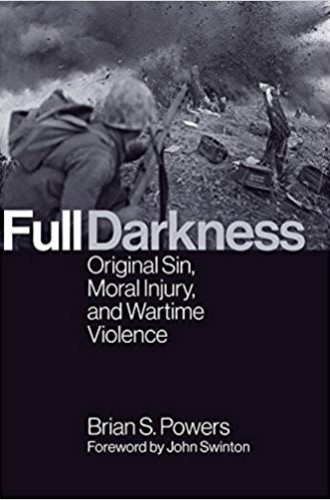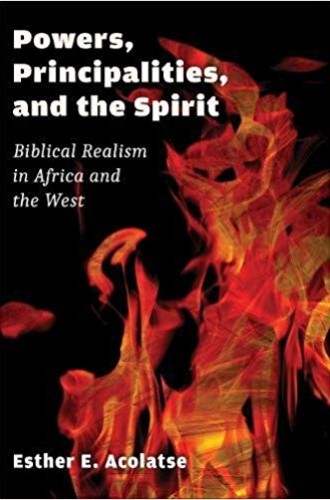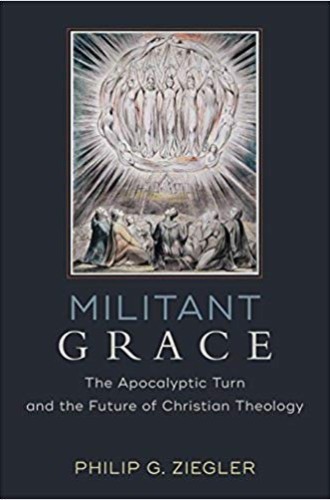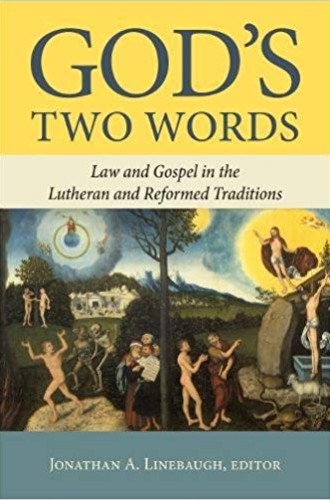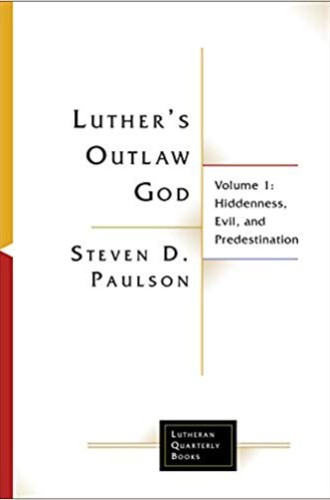Take & read: New books in theology
To speak words of grace, we must first name the powers and principalities that hold us captive.
Last fall a jury found an Iowa father guilty of murder after his four-month-old son, Sterling, was found dead in a motorized swing. The baby, who weighed less than five pounds at death, was left in the swing for over a week. He was not bathed or changed that entire time. The county sheriff told jurors he found maggots and larva in the layers of urine-soaked blankets and clothing on Sterling’s body. The father “was aware of what was going on and he chose to do nothing,” said assistant Iowa attorney general Denise Timmins.
That I can still fetch this story from memory indicates how horrified I was to read about it. As a person, I was aghast. But as a preacher, as a Christian for that matter, I felt cowed. I wondered if the gospel I preach, the gospel I believe in my bones, is adequate to account for a world with such a story in it. I’m haunted by the hunch that plenty of parishioners have read a story like Sterling’s in the newspaper and—because the gospel I’d given them was too short in its scope and too small in its dramatis personae—were left so ill-equipped for what Brian Powers calls “naming the wrongness of the world” that they quietly slipped away.
Read our latest issue or browse back issues.
In Full Darkness: Original Sin, Moral Injury, and Wartime Violence (Eerdmans), Powers makes plain the balm the church forsakes when it jettisons the language of sin. A veteran of the wars in Afghanistan and Iraq, Powers shows that the language of original sin and the fallenness of creation not only provides a narrative that the world needs, it offers a path for veterans, traumatized by war and shamed by their participation in it, to find redemptive healing.
The violence of war distorts our world. It also distorts the coherence of the gospel. Powers, like many veterans, struggled with the dissonance between the public perception of war’s violence as serving the greater good and how those who wreak such violence experience it firsthand. The trauma of moral ambiguity felt by veterans, Powers argues, exposes the naïveté of the view often offered by the church.
Powers blames latent Pelagianism. By overly esteeming the individual’s moral autonomy in the world, we’ve become blind to our own capacity for sin and violence. We’ve lost our appreciation for what Paul calls the spiritual forces of evil—and its tenacity at corrupting even the noblest of human intentions. As a consequence, we’ve lost in our politics a sense of humility. Convinced of our own goodness, we no longer enter the public square with a posture of grace toward our neighbors.
Powers rehabilitates Augustine’s understanding of original sin as an account of an alienated human condition where an incursion of God’s grace became necessary to the narrative of the Bible. Original sin, in other words, isn’t a way of explaining why we do what we do (and why we deserve what was done to Christ in our place). It’s a way of describing what the world does to us. Original sin names our captivity to the “wrongness of the world” from which cross and resurrection is our rescue.
The language of original sin, therefore, is the necessary entry point to the redemptive power of the gospel, for the God who judges in Christ is also the God who forgives those who know themselves to be guilty—even if the modern world no longer knows how to articulate such guilt. The cross, Powers shows, is medicine to those who know they’ve been duped by the world into becoming cross-builders. It’s the way to forgiveness.
What Powers calls “the wrongness of the world,” Esther E. Acolatse names (in unabashedly apocalyptic Pauline language) as “principalities and powers.” In Powers, Principalities, and the Spirit: Biblical Realism in Africa and the West (Eerdmans), Acolatse asserts that loss of the Bible’s premodern language in the West mutes the message of the gospel by razing the spiritual architecture of the New Testament. This loss makes it difficult for Christians to negotiate a world that languishes in bondage to a power that is not God.
The Bible’s worldview becomes unintelligible, Acolatse shows, when we reduce the salvation story’s cast to three characters: God, Christ, and humanity. To grasp the cosmic scope of what Christ reveals about the condition of the world, the cast requires four characters: God, Christ, humanity, and the enemy (which Paul refers to as sin, death, the powers, and Satan). The language of Satan so thoroughly saturates the New Testament, Acolatse insists, that you can’t speak proper Christian without it; you certainly can’t confess “Jesus is Lord” in the fullness meant by Paul. As much as Jesus was a teacher, a wonder-worker, a prophet, a preacher, or a revolutionary, Acolatse shows that he was also an exorcist.
Acolatse demonstrates that the charismatic worship style of Christians in the Global South signifies their theological difference from Christians in the West. What separates the two traditions is the former’s robust understanding of the reality of “the cosmic powers of this present darkness” (Eph. 6:12). The demands of the modern West’s secular culture and its academic guild, Acolatse suggests, has produced a Christianity shorn of its mythic, apocalyptic dimensions. The faith that remains is bereft of its power to name the wrongness in the world.
A Christianity fitted for the boundaries of the modern world cannot outfit people to negotiate the world as they actually experience it. Ultimately, Acolatse’s aim is pastoral. She recommends a recovery of the New Testament’s apocalyptic strand because she believes it to be helpful for Christian living. Charismatic Christianity is the fastest-growing form of the faith, she believes, precisely because it best narrates people’s lived experience in the world.
Demons strike us as primitive and superstitious until we’re confronted by a story like that of a baby boy left in a swing for seven days to die. And suddenly the way the New Testament invites us to see the world—as bound by powers more elusive than flesh and blood—sounds like the only true and sufficient manner of speech.
If Acolatse is correct that a Christianity rendered reasonable is not helpful, then what the church in the modern West requires is something like an apocalyptic catechesis, a resource to integrate the New Testament’s apocalyptic register into the full breadth of its beliefs and praxis. Taking his cues from Gerhard Forde and J. Louis Martyn, Philip G. Ziegler provides just such help in Militant Grace: The Apocalyptic Turn and the Future of Christian Theology (Baker Academic). Apocalyptic is the word Paul chooses to describe God’s invasion of the cosmos in cross and resurrection, Ziegler says, “thereby revealing the world’s utter foolishness, reclaiming the world, and inaugurating a battle that will doubtless culminate in the triumph of God over all God’s enemies.” Theology should be shaken and disciplined by the revelation of Christ and his cross.
This invasion means that a chief attribute of the gospel is its discontinuity with the expectations that we, captive to the principalities and powers, bring to it. When God in Christ enters our world, he invades occupied territory, wielding a weapon called grace to “bring into existence,” as Paul writes to the Ephesians, “the things that do not exist.”
When we demythologize the New Testament’s kergyma, pushing the powers and principalities off the stage, we inadvertently render grace inert. Ziegler recovers an understanding of grace as the weapon God deploys in an occupied world. Likewise, Acolatse cites Karl Barth’s admonition that our tendency to desire a Christianity of law instead of grace is idolatry. We revert from grace to the law, Barth says, because the law helps us avoid acknowledging that we live in a world held hostage by the principalities and powers. A world where we need God to intervene frightens us. It’s more reassuring to believe we require rules than rescue.
Ziegler and Acolatse provide a frame for two complementary books, God’s Two Words: Law and Gospel in the Lutheran and Reformed Traditions, edited by Jonathan A. Linebaugh (Eerdmans), and Steven D. Paulson’s Luther’s Outlaw God, Volume 1: Hiddenness, Evil, and Predestination (Fortress). When Christianity is evacuated of its apocalyptic cosmology, grace is conjugated into a past-tense message of pardon. The promise of grace becomes mere proclamation of what God has already done, not a power that comes extra nos (from outside of us) by which God continues to wrest creation from its captivity to sin and death.
The word of grace is God’s weapon handed to the church whom God has conscripted into the cause of redemption. Thus, the proper distinction between God’s two words, law and gospel, is more than the means by which preachers rightly interpret the Bible. It is the way we distinguish between the idol that falsely promises us refuge and the promise of God’s present-tense power in a world imprisoned by the powers. As Linebaugh notes in God’s Two Words, for Luther “rescue is the real subject of theology.”
The promise of grace is the power by which God has elected to rescue us from the enemy. But God’s militant grace does not make us passive recipients of a rescue operation. If God’s chosen means of rescue is a promise, then God requires preachers to pull it off. As feisty as Luther himself, Paulson ferrets out the implications of Luther’s distinction between the unpreached God and the preached God. The unpreached God is the hidden God, naked and unknowable. The preached God is the God who clothes himself with words. The God who condescended to us in Jesus Christ condescends still. Wearing the promise of the gospel, God liberates us through the mouth of a preacher. As Paulson puts it, saving faith “is the result of a preacher applying predestination to a sinner.”
Taken together, these five books give Christians—and preachers especially—something to say in a world with stories like Sterling’s in it. They demand that we allow the apocalyptic message of the gospel to name the wrongness in our assumptions about the material world: “The reason the Son of God appeared was to destroy the devil’s work” (1 John 3:8). They remind us that what we proclaim, the promise of grace, is what the living, loquacious God is up to in a world yet resistant to its rescue from the powers that bind it.
Read Jonathan Tran's Take & read: New books in ethics and Amy Erickson's Take & read: New books in Old Testament.


